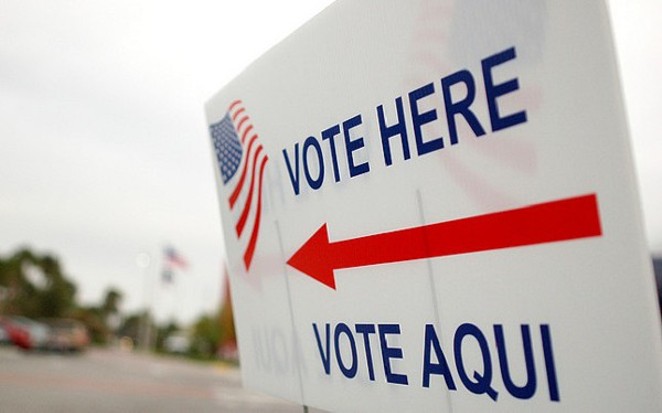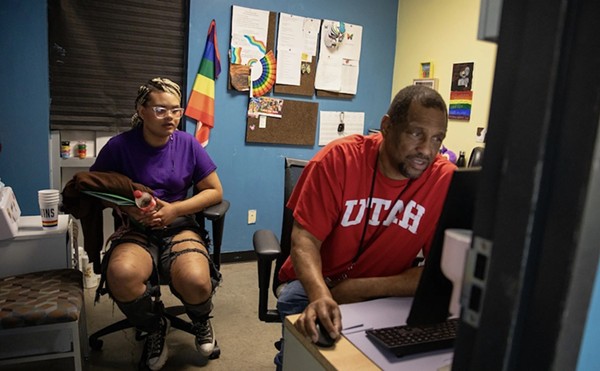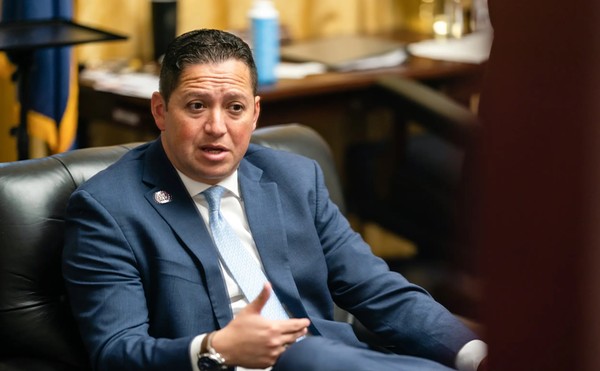Fifty years ago today, President Lyndon B. Johnson signed the Voting Rights Act of 1965, which was a significant step toward equality between whites and everyone else in the states after more than a century of racism, slavery, segregation and host of other wrongs.
While discrimination continued then and now, in different forms, everyone had the right to cast a vote.
Then, in 2011, Texas had an idea.
"The Texas ID law is one of the strictest of its kind in the country. It requires voters to bring a government-issued photo ID to the polls," The New York Times reports. "Accepted forms of identification include a driver's license, a United States passport, a concealed-handgun license and an election identification certificate issued by the State Department of Public Safety."
Critics called the law discriminatory and a federal court agreed in 2014, saying the Lone Star State voter legislation was not only discriminatory toward minorities, it constituted a poll tax.
Yesterday, a conservative federal appeals court based in New Orleans, Louisiana, ruled that the law was discriminatory but was not a poll tax.
So far, three elections have been held under the law and it will stay in effect — for the moment.
The Associated Press reports the case now gets kicked to the federal court in Corpus Christi, which is where the poll tax finding was made. That court will now decide whether Texas' legislators intended to discriminate against minority voters when creating the strict law.
Texas Attorney General Ken Paxton — who is indicted on suspicion of securities fraud and might be held in contempt of court for allegedly violating a court order prohibiting the state's same-sex marriage ban — was eager to talk about keeping the state's discriminatory voter law in place, which probably distracts him from his legal woes.
Paxton is really practicing the spin on this one:
"Today's ruling was a victory on the fundamental question of Texas' right to protect the integrity of our elections and the state's common sense Voter ID law remains in effect. I'm particularly pleased the panel saw through and rejected the plaintiffs' claim that our law constituted a 'poll tax.' The intent of this law is to protect the voting process in Texas, and we will continue to defend this important safeguard for all Texas Voters," Paxton says in a statement.
Governor Greg Abbott didn't have much to say about the law he spent time defending, but did release a small statement:
"In light of ongoing voter fraud, it is imperative that Texas has a voter ID law that prevents cheating at the ballot box. Texas will continue to fight for its voter ID requirement to ensure the integrity of elections in the Lone Star State," Abbott says.
One of Texas' mouthiest legislators, Ted Cruz, who is running for president, and recently cooked some shitty-looking bacon on a machine gun, also released a statement. And like Paxton, he's really working on that spin.
"I am pleased the 5th Circuit Court of Appeals invalidated much of the District Court's analysis on the Texas Voter ID Law — including the erroneous conclusion that it some how constituted a poll tax. However, the Court's decision that SB 14 violates Section 2 of the Voting Rights Act is profoundly disappointing," he says, with sincerely empathetic face that he practices in the mirror before trying to relate with regular people.
Cruz goes on:
"There is nothing 'discriminatory' about a law that protects the legitimate votes of American citizens and promotes the integrity of our elections — which is precisely what Texas' common sense Voter ID Law does."
That's probably a typo, that last part about protecting the integrity of elections because that's what the Voting Rights Act of 1965 that was signed 50 years ago today does. And that's precisely the law the Texas' "common sense" law violates.

KEEP SA CURRENT!
Since 1986, the SA Current has served as the free, independent voice of San Antonio, and we want to keep it that way.
Becoming an SA Current Supporter for as little as $5 a month allows us to continue offering readers access to our coverage of local news, food, nightlife, events, and culture with no paywalls.
Scroll to read more San Antonio News articles
About The Author
Newsletters
Join SA Current Newsletters
Subscribe now to get the latest news delivered right to your inbox.


















